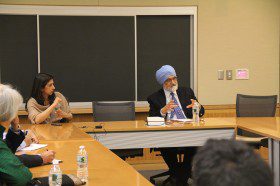 By Ghazal Gulati, Ed. M Candidate, Harvard Graduate School of Education, @GhazalGulati
By Ghazal Gulati, Ed. M Candidate, Harvard Graduate School of Education, @GhazalGulati
On May 1, 2015, the South Asia Institute (SAI) hosted an engaging and insightful conversation with Montek Singh Ahluwalia, Former Deputy Chairman of the Planning Commission of India. The event was chaired by Rohini Pande, Mohammed Kamal Professor of Public Policy, Harvard Kennedy School.
With an audience that ranged from young students of Harvard College to Shiv Shankar Menon, former National Security Advisor, India and Dr. Isher Judge Ahluwalia, Chairperson, Board of Governors, Indian Council for Research on International Economic Relations, the discussion covered many challenges facing India’s economy and the importance of policy design and implementation.
Dr. Ahluwalia began the talk by giving a broad overview of India’s economic growth in the last two decades. He was quick to point out that global economic growth should not be attributed solely to the fast growth of the Chinese economy. In fact, in the last twelve years, India’s growth has accelerated more than China’s. Dr. Ahluwalia’s beliefs were that India could learn important lessons from China’s experiences, but should not attempt to compete with the country. He also explained that growth rate comparisons were not key, and that India needs to find ways to harvest the gains of economic growth.
Before discussing policy challenges in detail, Dr. Ahluwalia, explained some of the weaknesses that have emerged from India’s growth story. These include a precarious macro balance situation, and regulatory constraints that do not support growth and corruption. He then laid out a broad framework through which policy challenges in India should be viewed. First, there is an inherent tendency of policy makers to prefer gradualism over broad, sweeping reforms. Second, there is a need to have a holistic view of public policy, and a need to create mutually supportive inclusive policies. Third, due to the central, state and local government, no policy is really in the hands of just one administrative level.
Dr. Ahluwalia spoke briefly about various policy challenges facing India. These ranged from achieving macro level stability with internal and external balance to rethinking subsidized LPG and kerosene. He also spoke about the need to reduce subsidies and fiscal deficits, and the need to focus on public-private partnerships especially in infrastructure. Another area that was brought forth was improving the ease of doing business in India while balancing the the right regulations to protect the environment. Dr. Ahluwalia also commented on the need for and the current lack of power at the city level and for local governments who are managing large growing urban cities.
As chair of the event, Dr. Pande questioned Dr. Ahluwalia on the lack of good quality data and data systems in various sectors in India including taxation and governance. She illustrated how many datasets available in India are outdated, making evidence-based policy design extremely difficult. Further, the two also discussed the gap between policy design and actual implementation in the country.
The audience engaged with Dr. Ahluwalia on several issues. These ranged from the challenge of maintaining balance between large scale urbanization and ecological balance, the role of local government in the country, the reforms of the civil services in India and the need to move towards a more simple system of social security.
